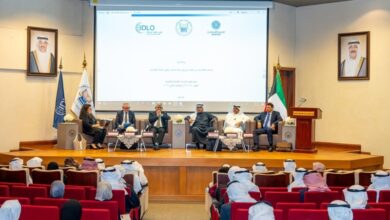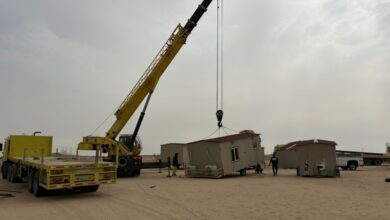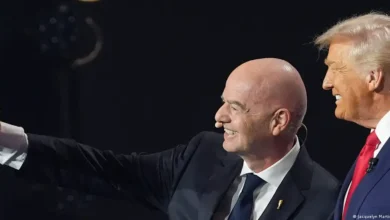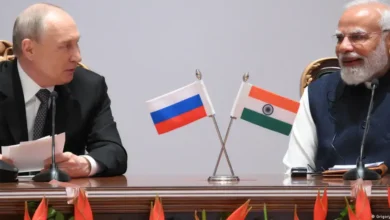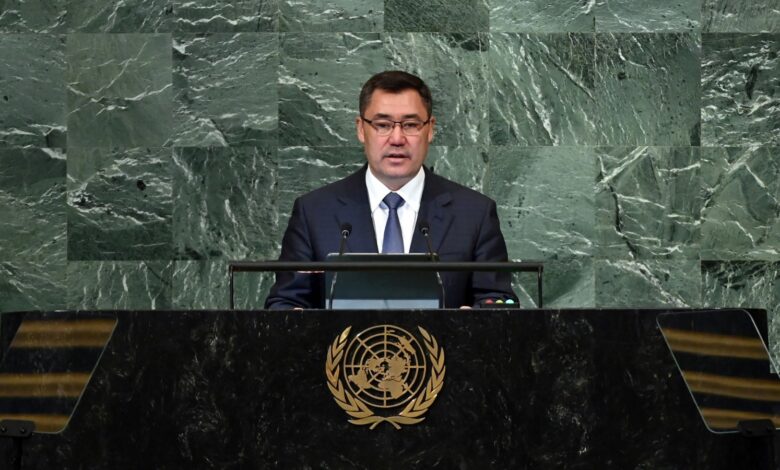
The President of Kyrgyzstan, Sadyr Zhaparov, addressed the General Debate of the 80th Session of the United Nations General Assembly in New York on September 23, delivering a speech that mixed diplomacy with unusually candid remarks.
He touched on global conflicts, sanctions, climate change, and the need for UN reform, positioning Kyrgyzstan as both a critic of double standards and an advocate of multilateral cooperation.
Opening his address, Zhaparov congratulated Annalena Baerbock on her election as President of the Assembly and hailed the UN’s eight decades of work in safeguarding peace.
He noted that despite recurring conflicts, the world has avoided a third global war largely because of the Organization’s role as a platform for dialogue.
He warned, however, that the current global order is strained by rising regionalism, sanctions, economic pressures, and the growing threats of terrorism and extremism. In this context, he described the UN as the only institution with both the authority and the capacity to respond.
Zhaparov spoke proudly of Kyrgyzstan’s political stability and socio-economic growth, stressing that such progress came at a high price. He described his country as recognized by the international community as one of the freest and most stable in Eurasia, with a strong civil society and a determined fight against corruption.
Departing from the traditional language of diplomacy, the Kyrgyz leader said he wished to speak “not as a diplomat” but as a citizen concerned by the suffering of millions. He cited wars in Ukraine, Palestine, Sudan, and Syria as examples of conflicts where ordinary people bear the heaviest toll.
On Ukraine, Zhaparov said Kyrgyzstan supported peace efforts led by U.S. President Donald Trump and Russian President Vladimir Putin, while criticizing the sanctions regime that has indirectly harmed his country’s fragile economy. He accused some Western governments of applying double standards by trading with Russia themselves while punishing others for similar ties.
“We cannot refuse cooperation with Russia,” he stated, emphasizing Kyrgyzstan’s extensive economic links with Moscow. He added that Bishkek would not allow its citizens’ welfare to be sacrificed to external pressure and demanded the lifting of sanctions imposed on two Kyrgyz banks.
Turning to the Middle East, Zhaparov described Gaza as “a graveyard for thousands of children,” echoing the words of the UN Secretary-General. He called for an end to what he termed genocide against Palestinians, urged an investigation by the International Court of Justice, and reiterated support for a two-state solution based on 1967 borders.
He simultaneously condemned terrorism, including the October 2023 attacks on Israel, but stressed that counter-terrorism operations must not come at the cost of civilian lives. He also denounced recent missile attacks on Qatar and Iran, labeling them violations of sovereignty and threats to regional stability.
Zhaparov devoted a significant portion of his address to Afghanistan, calling for the return of more than $9 billion in frozen assets to the Afghan people. He criticized Western governments for using financial tools to worsen humanitarian crises, insisting that such funds could instead support infrastructure, agriculture, and poverty relief.
On Africa, the Kyrgyz leader argued that the continent’s vast resources should serve its own development. He urged stronger UN peacekeeping operations and highlighted Kyrgyzstan’s own contributions, noting that Bishkek has sent troops to UN missions since independence in the 1990s.
The President underlined Kyrgyzstan’s commitment to nuclear disarmament and non-proliferation, reminding the Assembly that his country is both a party to the Treaty on the Non-Proliferation of Nuclear Weapons and a depository of the Central Asian Nuclear-Weapon-Free Zone. This year, Kyrgyzstan signed the Treaty on the Prohibition of Nuclear Weapons.
On regional issues, he pointed to Kyrgyzstan’s success in peacefully resolving border disputes with Uzbekistan and Tajikistan, calling it proof that political will and dialogue can transform contested frontiers into “borders of friendship, trade and cooperation.”
Climate change, Zhaparov stressed, poses a major threat to Kyrgyzstan as a mountainous state already witnessing glacier retreat, water shortages, and biodiversity loss. He championed the “from mountains to oceans” concept, arguing that protecting mountain ecosystems is inseparable from safeguarding seas and coasts.
He announced that Bishkek will host the Bishkek+25 Summit in 2027, a global platform for sustainable mountain development, and invited UN member states and experts to participate.
Zhaparov also used the forum to call for reform of the UN itself. Quoting former Secretary-General Dag Hammarskjöld, he reminded delegates that the Organization was created not to take humanity to heaven but to “save it from hell.” He supported Secretary-General António Guterres’ “UN-80” reform initiative and urged changes to the Security Council.
Currently, he said, the Security Council is dominated by 15 states, with the five permanent members holding veto power that undermines the interests of the wider membership. Kyrgyzstan supports expanding the representation of African nations and ending historical imbalances, while also highlighting that more than 60 countries, including his own, have never served on the Council.
To underscore the role of smaller states, Zhaparov announced Kyrgyzstan’s candidacy for non-permanent membership of the Council for the 2027–2028 term. He appealed for support from fellow UN members, saying this would enhance trust in the Organization and ensure fairer representation.
Concluding his speech, Zhaparov urged the world community to match words with actions. “The future of our planet is our shared responsibility,” he said, insisting that the challenges of today demand united responses rather than division.
Follow The Times Kuwait on
X, Instagram and Facebook for the latest news updates






















